Please log in to read this in our online viewer!
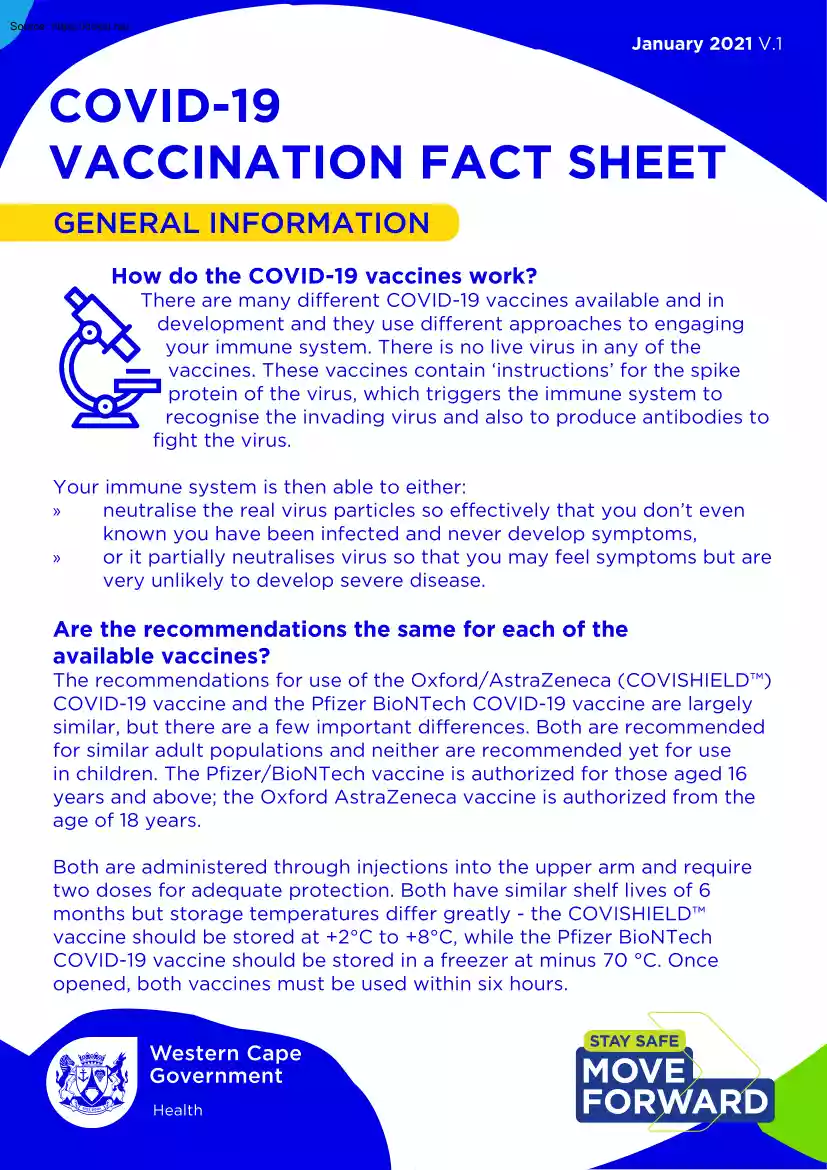
Please log in to read this in our online viewer!
No comments yet. You can be the first!
What did others read after this?
Content extract
January 2021 V.1 COVID-19 VACCINATION FACT SHEET GENERAL INFORMATION How do the COVID-19 vaccines work? There are many different COVID-19 vaccines available and in development and they use different approaches to engaging your immune system. There is no live virus in any of the vaccines. These vaccines contain ‘instructions’ for the spike protein of the virus, which triggers the immune system to recognise the invading virus and also to produce antibodies to fight the virus. Your immune system is then able to either: »» neutralise the real virus particles so effectively that you don’t even known you have been infected and never develop symptoms, »» or it partially neutralises virus so that you may feel symptoms but are very unlikely to develop severe disease. Are the recommendations the same for each of the available vaccines? The recommendations for use of the Oxford/AstraZeneca (COVISHIELD™) COVID-19 vaccine and the Pfizer BioNTech COVID-19 vaccine are largely
similar, but there are a few important differences. Both are recommended for similar adult populations and neither are recommended yet for use in children. The Pfizer/BioNTech vaccine is authorized for those aged 16 years and above; the Oxford AstraZeneca vaccine is authorized from the age of 18 years. Both are administered through injections into the upper arm and require two doses for adequate protection. Both have similar shelf lives of 6 months but storage temperatures differ greatly - the COVISHIELD™ vaccine should be stored at +2°C to +8°C, while the Pfizer BioNTech COVID-19 vaccine should be stored in a freezer at minus 70 °C. Once opened, both vaccines must be used within six hours. OUR VACCINATION PROGRAMME What are the aims of the vaccine programme in South Africa? While it cannot immediately eliminate COVID-19, the aims of the vaccine programme in South Africa are: »» »» »» To reduce illness and death from COVID-19 To stop transmission of COVID-19 To protect
the health system Rollout is planned in three phases: Phase I Phase II Phase III »» Health Care Workers: »» Public & Private Health Sectors »» Care Workers »» CHWs »» Health Science students »» Traditional Healers »» Essential Workers »» Older than 18 years »» Clients in congregate settings »» Older than 60 Years »» Older than 18 Years with »» Co-morbidities The first two phases will protect those most at risk of COVID because of their occupation, age or co-morbidities, and take pressure off our health system so that we can cope more effectively with COVID outbreaks and get back to providing care for other health conditions. The second and third phases will help reach a population immunity of 67% needed to stop transmission and end the pandemic. What vaccines will SA use? We will use a combination of vaccines for phases 1-3. The first batch of 15 million vaccine doses has been secured directly from the Serum Institute of India, the world’s largest
vaccine manufacturer, by the National Government. It is producing the vaccine under the tradename COVISHIELD™ for use in India, the UK and South Africa. South Africa will also receive around 10% of the vaccines it needs from the COVAX facility, which is a partnership between 190 countries to ensure rapid and equitable access for all countries regardless of income level. To date, COVAX has secured agreements for 370 million doses of the Oxford AstraZeneca vaccine from the Serum Institute of India. It has plans and memoranda of agreement with these and other groups for up to 2 billion doses of this and other vaccines. Additional doses of COVISHIELD™ vaccine from the Serum Institute of India, the Pfizer vaccine, and the Johnson and Johnson vaccine will be obtained through the African Union agreements and through direct agreements between these companies and the South African government. ABOUT THE OXFORD/ASTRAZENECA (COVISHIELD™) VACCINE What is it? The COVISHIELD™ vaccine is a
modified version of an adenovirus that causes the common cold. It has been modified so that it can’t replicate when used as a vaccine or cause illness. It acts as a delivery agent for the instructions for the coronavirus spike protein. Other vaccines like this have been widely used to prevent severe disease from influenza, Ebola and MERS (Middle Eastern Respiratory Syndrome, also caused by a coronavirus). The COVISHIELD™ vaccine does not contain live virus and will not give you COVID. What’s in it? It contains the weakened adenovirus encoding the SARS CoV 2 Spike glycoprotein, as well as the following excipients: - L-histidine L-histidine hydrochloride monohydrate magnesium chloride hexahydrate polysorbate 80 ethanol sucrose sodium chloride disodium edetate dihydrate water for injections The manufacturer’s information states that the vaccine does not contain any: • Preservatives • Antibiotics • Gluten • Nut-derived component • Soy-derived component • Egg-derived
component • Gelatin based component The COVISHIELD™ COVID-19 vaccine is produced in a human cell line, not animal content. While Halal certification for the COVISHIELD™ vaccine is not indicated, the British Islamic Medical Association has released a position statement recommending the COVISHIELD™ COVID-19 vaccine for the Muslim community. ABOUT THE OXFORD/ASTRAZENECA (COVISHIELD™) VACCINE Is it safe? Yes, vaccines are put through a number of tests and trials to confirm that they are safe. About the trials work During the trial of the COVISHIELD™ vaccine, safety data was collected from almost 24 000 people followed-up for several months. Half of the participants received the COVID vaccine, and the other half received either saline or a control vaccine. The control vaccine that was used is the meningococcal vaccine, which is a well-tested and widely used vaccine that prevents a fatal form of meningitis. It is usual to give a vaccine to the control group in early clinical
trials, so that both groups experience mild side-effects typical of vaccines. This allows the trial to be carried out to a very high standard because no-one enrolled in the trial or monitoring the health of participants during follow-up knows what vaccine the participant received, and so can’t influence the results. The review process Safety monitoring in the trial was intensive and involved two sets of independent scientific reviewers. All health concerns were documented and reviewed by an independent safety committee who had to decide if there was any possibility that the health ‘event’ could be linked to either the COVID vaccine or the control vaccine (meningococcal vaccine). Health events were rare during the study and occurred in less than 1% of participants with no difference between the group that received the COVID-19 vaccine and those who did not. The vast majority of events were typical health concerns like vomiting, chest pain, a new diagnosis of cancer or a bone
fracture. The safety committee was concerned about four events, and you may remember that the trial was temporarily suspended while they completed their investigations. These suspensions are usual during vaccine trials and show how seriously scientists take safety. The findings concluded that the four events were not related to the COVID-19 vaccine. While the trials show that the COVISHIELD™ vaccine has an excellent safety profile, usual vaccine side-effects are common. WHAT YOU CAN EXPECT & ARE ADVISED TO DO What are the side-effects? The side effects include pain at the site of the injection in the upper arm, feeling unwell, tired, feverish and headache. These side-effects do not mean that the vaccine is not safe. Rather these side-effects are signs that the body is responding to the vaccine by mounting an immune response. The technical term for this is reactogenicity These side-effects tend to be worse one day after receiving the vaccine and resolve within 4-5 days. You
can use paracetamol or an anti-inflammatory analgesic to ease symptoms. I have had a severe allergic reaction or anaphylaxis in the past and am worried. What should I do? A small number of severe allergic reactions or anaphylaxis have been reported by news outlets with the rollout of the Pfizer and Moderna vaccines in the US and other high-income countries. It should be remembered that these events are extremely rare and already millions of doses of these vaccines have been administered. To date no case of anaphylaxis has been reported with the COVISHIELD™ vaccine. If you have suffered a severe allergy or anaphylaxis to a medication or food in the past you need to talk to your doctor before receiving the vaccine. Can I stop general COVID-19 protection measures once I have the vaccine? No, you should continue to use general COVID-19 protection measures (such as wearing a mask, practising social distancing & sanitising hands and frequently touched objects regularly) after being
vaccinated. Vaccine studies have only produced enough data to show that being vaccinated is safe and can protect people from getting sick, particularly severe COVID, and dying from COVID-19. We still need evidence to show that vaccinated people do not spread the virus to others. It remains possible that a vaccinated person could spread the virus to others, even if they are not showing any symptoms. WHAT YOU CAN EXPECT & ARE ADVISED TO DO Do I need the vaccine if I have already had COVID-19? Yes, you should still be vaccinated if you have had COVID-19 previously or if you have a positive antibody test. So far, it has been found the natural immunity that you may gain from having had COVID-19 does not last long. Vaccination will prevent you from being reinfected with COVID-19 once your natural immunity has worn off Can I have the vaccine if I have symptoms of COVID or am in quarantine? The current recommendation is that if you are in quarantine following close contact with
someone with COVID-19 you should finish your ten-day quarantine period before receiving the vaccine. There is no data available to show that vaccination immediately post-exposure will prevent disease as it is unlikely that the vaccine would get an immune response quickly enough to protect you from developing COVID-19. If you currently have COVID, you should wait until you have recovered from the initial illness and have completed your isolation period before getting vaccinated. This also applies if you have symptoms of COVID before vaccination or develop symptoms between the first and second dose of the vaccine (so you might need to wait to receive your second dose). If you receive the vaccine while having asymptomatic infection it may decrease the severity of disease but should not cause additional harm. People who received monoclonal antibodies or convalescent plasma for severe COVID are advised to delay vaccination for 90 days as these treatments may reduce the effectiveness of the
vaccine. MICROCHIP, DNA, BIG PHARMA & VACCINE DEVELOPMENT FACT CHECK Does the vaccine contain a microchip? There has been no evidence found to support the claims, circulating on social media, that the COVID-19 vaccine will contain a microchip and that this plan is being led by Bill Gates. The suggestion that Bill Gates was involved came from an interview in March 2020, when Gates detailed plans to develop novel means of digital health certificates. The Bill and Melinda Gates Foundation is funding the development of a novel way of dying skin as a means of tracking whether people have been vaccinated (as a form of medical record), however this technology is still under development and will not be used with the COVID-19 vaccine. This technology does not make use of microchip technology and would not allow for someone to be tracked. In addition, the video circulating on social media that shows commentary from Bill and Melinda Gates and Jack Ma has been edited, with their comments
selectively combined. Will the vaccine alter my DNA? All living beings have DNA and RNA – the genetic code or information needed to build and maintain a living being. There have been widespread claims on social media that the COVID-19 vaccine could somehow alter your DNA. This confusion might arise from the way in which some of the new COVID-19 vaccines work, where a fragment of the virus’s genetic code is used in the vaccine. However, viral RNA and DNA does not have any effect on human DNA and is not taken up into the body’s own DNA when injected. Instead, the viral RNA/DNA helps the human immune system recognise what the virus looks like and so mount a better defence response. MICROCHIP, DNA, BIG PHARMA & VACCINE DEVELOPMENT FACT CHECK Are these vaccines a scheme by big pharma to control us? The COVID-19 vaccines are being developed and tested by a range of different companies, often with “big pharma” companies in collaboration with smaller companies (for example,
Pfizer is collaborating with a small German company called BioNTech), university research groups (such as the Universities of Oxford and Harvard), and government institutions (such as US National Institute of Health). Development has been funded by government, global agency investments, pharmaceutical companies, private donors, and even celebrities. As such, this development is being strongly led by academic research groups, clinical scientists, and government research organisations, rather than big pharmaceutical companies on their own. Some companies are making the vaccine available on a non-profit basis. The most important of these is AstraZeneca who has partnered with 10 major pharmaceutical manufacturers to scale up production of their vaccine and has committed to providing the vaccine at no-profit for the duration of the pandemic. Global NGOs like Médecins Sans Frontières are engaged in vital advocacy work to ensure companies are transparent about their costs and the period for
which they have waived usual forprofit arrangements. How was it created so quickly? The biggest misconception is the work on the vaccine started when the pandemic began. The COVID-19 vaccine was developed quicker than any other vaccine in medical history because of years of previous research on related viruses, faster ways to manufacture vaccines, enormous funding that allowed firms to run multiple trials in parallel, and regulators moving more quickly than normal. REMEMBER: The COVID-19 vaccine is not compulsory for healthcare workers or the general public, and the decision to decline the offer will be respected
similar, but there are a few important differences. Both are recommended for similar adult populations and neither are recommended yet for use in children. The Pfizer/BioNTech vaccine is authorized for those aged 16 years and above; the Oxford AstraZeneca vaccine is authorized from the age of 18 years. Both are administered through injections into the upper arm and require two doses for adequate protection. Both have similar shelf lives of 6 months but storage temperatures differ greatly - the COVISHIELD™ vaccine should be stored at +2°C to +8°C, while the Pfizer BioNTech COVID-19 vaccine should be stored in a freezer at minus 70 °C. Once opened, both vaccines must be used within six hours. OUR VACCINATION PROGRAMME What are the aims of the vaccine programme in South Africa? While it cannot immediately eliminate COVID-19, the aims of the vaccine programme in South Africa are: »» »» »» To reduce illness and death from COVID-19 To stop transmission of COVID-19 To protect
the health system Rollout is planned in three phases: Phase I Phase II Phase III »» Health Care Workers: »» Public & Private Health Sectors »» Care Workers »» CHWs »» Health Science students »» Traditional Healers »» Essential Workers »» Older than 18 years »» Clients in congregate settings »» Older than 60 Years »» Older than 18 Years with »» Co-morbidities The first two phases will protect those most at risk of COVID because of their occupation, age or co-morbidities, and take pressure off our health system so that we can cope more effectively with COVID outbreaks and get back to providing care for other health conditions. The second and third phases will help reach a population immunity of 67% needed to stop transmission and end the pandemic. What vaccines will SA use? We will use a combination of vaccines for phases 1-3. The first batch of 15 million vaccine doses has been secured directly from the Serum Institute of India, the world’s largest
vaccine manufacturer, by the National Government. It is producing the vaccine under the tradename COVISHIELD™ for use in India, the UK and South Africa. South Africa will also receive around 10% of the vaccines it needs from the COVAX facility, which is a partnership between 190 countries to ensure rapid and equitable access for all countries regardless of income level. To date, COVAX has secured agreements for 370 million doses of the Oxford AstraZeneca vaccine from the Serum Institute of India. It has plans and memoranda of agreement with these and other groups for up to 2 billion doses of this and other vaccines. Additional doses of COVISHIELD™ vaccine from the Serum Institute of India, the Pfizer vaccine, and the Johnson and Johnson vaccine will be obtained through the African Union agreements and through direct agreements between these companies and the South African government. ABOUT THE OXFORD/ASTRAZENECA (COVISHIELD™) VACCINE What is it? The COVISHIELD™ vaccine is a
modified version of an adenovirus that causes the common cold. It has been modified so that it can’t replicate when used as a vaccine or cause illness. It acts as a delivery agent for the instructions for the coronavirus spike protein. Other vaccines like this have been widely used to prevent severe disease from influenza, Ebola and MERS (Middle Eastern Respiratory Syndrome, also caused by a coronavirus). The COVISHIELD™ vaccine does not contain live virus and will not give you COVID. What’s in it? It contains the weakened adenovirus encoding the SARS CoV 2 Spike glycoprotein, as well as the following excipients: - L-histidine L-histidine hydrochloride monohydrate magnesium chloride hexahydrate polysorbate 80 ethanol sucrose sodium chloride disodium edetate dihydrate water for injections The manufacturer’s information states that the vaccine does not contain any: • Preservatives • Antibiotics • Gluten • Nut-derived component • Soy-derived component • Egg-derived
component • Gelatin based component The COVISHIELD™ COVID-19 vaccine is produced in a human cell line, not animal content. While Halal certification for the COVISHIELD™ vaccine is not indicated, the British Islamic Medical Association has released a position statement recommending the COVISHIELD™ COVID-19 vaccine for the Muslim community. ABOUT THE OXFORD/ASTRAZENECA (COVISHIELD™) VACCINE Is it safe? Yes, vaccines are put through a number of tests and trials to confirm that they are safe. About the trials work During the trial of the COVISHIELD™ vaccine, safety data was collected from almost 24 000 people followed-up for several months. Half of the participants received the COVID vaccine, and the other half received either saline or a control vaccine. The control vaccine that was used is the meningococcal vaccine, which is a well-tested and widely used vaccine that prevents a fatal form of meningitis. It is usual to give a vaccine to the control group in early clinical
trials, so that both groups experience mild side-effects typical of vaccines. This allows the trial to be carried out to a very high standard because no-one enrolled in the trial or monitoring the health of participants during follow-up knows what vaccine the participant received, and so can’t influence the results. The review process Safety monitoring in the trial was intensive and involved two sets of independent scientific reviewers. All health concerns were documented and reviewed by an independent safety committee who had to decide if there was any possibility that the health ‘event’ could be linked to either the COVID vaccine or the control vaccine (meningococcal vaccine). Health events were rare during the study and occurred in less than 1% of participants with no difference between the group that received the COVID-19 vaccine and those who did not. The vast majority of events were typical health concerns like vomiting, chest pain, a new diagnosis of cancer or a bone
fracture. The safety committee was concerned about four events, and you may remember that the trial was temporarily suspended while they completed their investigations. These suspensions are usual during vaccine trials and show how seriously scientists take safety. The findings concluded that the four events were not related to the COVID-19 vaccine. While the trials show that the COVISHIELD™ vaccine has an excellent safety profile, usual vaccine side-effects are common. WHAT YOU CAN EXPECT & ARE ADVISED TO DO What are the side-effects? The side effects include pain at the site of the injection in the upper arm, feeling unwell, tired, feverish and headache. These side-effects do not mean that the vaccine is not safe. Rather these side-effects are signs that the body is responding to the vaccine by mounting an immune response. The technical term for this is reactogenicity These side-effects tend to be worse one day after receiving the vaccine and resolve within 4-5 days. You
can use paracetamol or an anti-inflammatory analgesic to ease symptoms. I have had a severe allergic reaction or anaphylaxis in the past and am worried. What should I do? A small number of severe allergic reactions or anaphylaxis have been reported by news outlets with the rollout of the Pfizer and Moderna vaccines in the US and other high-income countries. It should be remembered that these events are extremely rare and already millions of doses of these vaccines have been administered. To date no case of anaphylaxis has been reported with the COVISHIELD™ vaccine. If you have suffered a severe allergy or anaphylaxis to a medication or food in the past you need to talk to your doctor before receiving the vaccine. Can I stop general COVID-19 protection measures once I have the vaccine? No, you should continue to use general COVID-19 protection measures (such as wearing a mask, practising social distancing & sanitising hands and frequently touched objects regularly) after being
vaccinated. Vaccine studies have only produced enough data to show that being vaccinated is safe and can protect people from getting sick, particularly severe COVID, and dying from COVID-19. We still need evidence to show that vaccinated people do not spread the virus to others. It remains possible that a vaccinated person could spread the virus to others, even if they are not showing any symptoms. WHAT YOU CAN EXPECT & ARE ADVISED TO DO Do I need the vaccine if I have already had COVID-19? Yes, you should still be vaccinated if you have had COVID-19 previously or if you have a positive antibody test. So far, it has been found the natural immunity that you may gain from having had COVID-19 does not last long. Vaccination will prevent you from being reinfected with COVID-19 once your natural immunity has worn off Can I have the vaccine if I have symptoms of COVID or am in quarantine? The current recommendation is that if you are in quarantine following close contact with
someone with COVID-19 you should finish your ten-day quarantine period before receiving the vaccine. There is no data available to show that vaccination immediately post-exposure will prevent disease as it is unlikely that the vaccine would get an immune response quickly enough to protect you from developing COVID-19. If you currently have COVID, you should wait until you have recovered from the initial illness and have completed your isolation period before getting vaccinated. This also applies if you have symptoms of COVID before vaccination or develop symptoms between the first and second dose of the vaccine (so you might need to wait to receive your second dose). If you receive the vaccine while having asymptomatic infection it may decrease the severity of disease but should not cause additional harm. People who received monoclonal antibodies or convalescent plasma for severe COVID are advised to delay vaccination for 90 days as these treatments may reduce the effectiveness of the
vaccine. MICROCHIP, DNA, BIG PHARMA & VACCINE DEVELOPMENT FACT CHECK Does the vaccine contain a microchip? There has been no evidence found to support the claims, circulating on social media, that the COVID-19 vaccine will contain a microchip and that this plan is being led by Bill Gates. The suggestion that Bill Gates was involved came from an interview in March 2020, when Gates detailed plans to develop novel means of digital health certificates. The Bill and Melinda Gates Foundation is funding the development of a novel way of dying skin as a means of tracking whether people have been vaccinated (as a form of medical record), however this technology is still under development and will not be used with the COVID-19 vaccine. This technology does not make use of microchip technology and would not allow for someone to be tracked. In addition, the video circulating on social media that shows commentary from Bill and Melinda Gates and Jack Ma has been edited, with their comments
selectively combined. Will the vaccine alter my DNA? All living beings have DNA and RNA – the genetic code or information needed to build and maintain a living being. There have been widespread claims on social media that the COVID-19 vaccine could somehow alter your DNA. This confusion might arise from the way in which some of the new COVID-19 vaccines work, where a fragment of the virus’s genetic code is used in the vaccine. However, viral RNA and DNA does not have any effect on human DNA and is not taken up into the body’s own DNA when injected. Instead, the viral RNA/DNA helps the human immune system recognise what the virus looks like and so mount a better defence response. MICROCHIP, DNA, BIG PHARMA & VACCINE DEVELOPMENT FACT CHECK Are these vaccines a scheme by big pharma to control us? The COVID-19 vaccines are being developed and tested by a range of different companies, often with “big pharma” companies in collaboration with smaller companies (for example,
Pfizer is collaborating with a small German company called BioNTech), university research groups (such as the Universities of Oxford and Harvard), and government institutions (such as US National Institute of Health). Development has been funded by government, global agency investments, pharmaceutical companies, private donors, and even celebrities. As such, this development is being strongly led by academic research groups, clinical scientists, and government research organisations, rather than big pharmaceutical companies on their own. Some companies are making the vaccine available on a non-profit basis. The most important of these is AstraZeneca who has partnered with 10 major pharmaceutical manufacturers to scale up production of their vaccine and has committed to providing the vaccine at no-profit for the duration of the pandemic. Global NGOs like Médecins Sans Frontières are engaged in vital advocacy work to ensure companies are transparent about their costs and the period for
which they have waived usual forprofit arrangements. How was it created so quickly? The biggest misconception is the work on the vaccine started when the pandemic began. The COVID-19 vaccine was developed quicker than any other vaccine in medical history because of years of previous research on related viruses, faster ways to manufacture vaccines, enormous funding that allowed firms to run multiple trials in parallel, and regulators moving more quickly than normal. REMEMBER: The COVID-19 vaccine is not compulsory for healthcare workers or the general public, and the decision to decline the offer will be respected
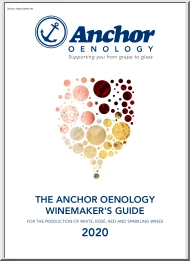
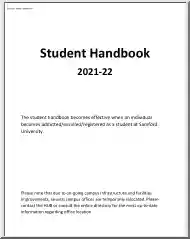
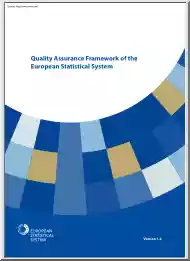
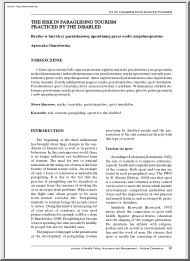
 When reading, most of us just let a story wash over us, getting lost in the world of the book rather than paying attention to the individual elements of the plot or writing. However, in English class, our teachers ask us to look at the mechanics of the writing.
When reading, most of us just let a story wash over us, getting lost in the world of the book rather than paying attention to the individual elements of the plot or writing. However, in English class, our teachers ask us to look at the mechanics of the writing.